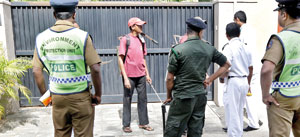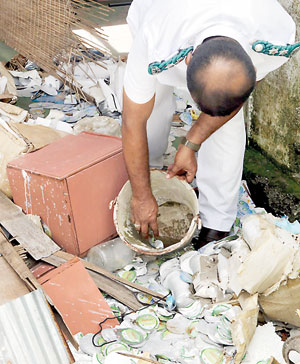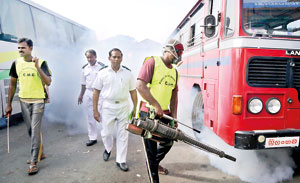News
Homeowners in Colombo play hide-and-seek with dengue teams

Gates closed: In some areas in Colombo although householders appeared to be at home these officers and CMC workers were not welcome inside to check the premises. Pix by M.A. Pushpa Kumara
Non co-operative Colombo city residents, the failure of public and private institutions to maintain their premises and abandoned buildings and lands were major obstacles for officials carrying out a three-day anti-dengue campaign that ended yesterday.
Colombo Municipal Council Public Health Inspectors (PHIs) along with the environmental police and army engaged carried out checks on 2,667 premises and found 29 sites with mosquito larvae while more than 200 breeding places were also located.
CMC Chief Medical Officer Ruwan Wijayamuni said officials raided public and private property including residences while fogging public places including bus stands and railway yards.
“We deployed more than 300 officials a day including 50 PHIs as well as 250 forces personnel,” he said.
Dr Wijayamuni said more than 2,500 houses, 99 private institutes, 17 state institutions and 11 construction sites, four religious places, three schools and two public sites were searched.
A Sunday Times team that accompanied teams carrying out searches in Cinnamon Gardens, Kollupitiya and Borella witnessed as to how residents resisted search operations.
The PHIs were checking gutters, drains and house interiors as well as hollows in trees in gardens.
They were trying to visit every house but co-operation was minimal.

Abandoned workplace of a food beverage labelling company
Residents of several homes at Cambridge Terrace were unresponsive when the PHIs knocked at their gates. Even houses that had windows open, indicating the householders were present, disregarded the calls.
Senior PHI I.G.S.R. Bandara said officials were forced to put yellow cards in mailboxes requesting the house owners to inform the CMC that they do not have dengue breeding places at their premises.
“We cannot enter most houses, so most areas that breed mosquitoes go undetected,” he said.
Wanathamulla PHI Dehan Withanage said a colleague inspecting a private bank on Thurstan Road had found mospquitoes teeming in a clay water container holding a flower pot.
Ministry medical officer Dr Samadara Methasinghe, who also joined the raid, was quick to fine the financial institute officials who accepted that they had missed the spot during cleaning.
Dr. Methasinghe explained that already the mosquitoes bred from the water collected in that container could be roaming in a 200m area.
Borella PHI Krishantha Seneviratne said he had found three dengue breeding places – a house, a private institute and an abandoned building.
The Sunday Times saw the abandoned workplace of a food beverage labelling company. The entrance to the building had been torn down and in the rubbish-clogged drains and pits water had collected. There were discarded buckets, bottles and heaps of tyres holding water – prime potential breeding grounds.
Senior Public Health Official N.K.D. Dharmadasa, led a team of eight workers fogging and spraying public transport sites. They started their programme at the Pettah SLTB bus stand, spraying drains and fogging the interior of buses using four fumigation machines.
The final fumigation for the day was done at Maligawatte Railway yard where old trains as well as trains used for long distance transport were fogged.
PHI Suresh Kumara said transport hubs and carriers were being fumigated to stop dengue spreading between Colombo and other areas.

Fumigating the main bus stand in Colombo Pettah

